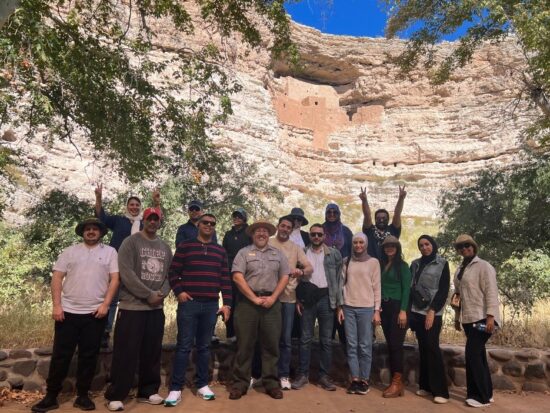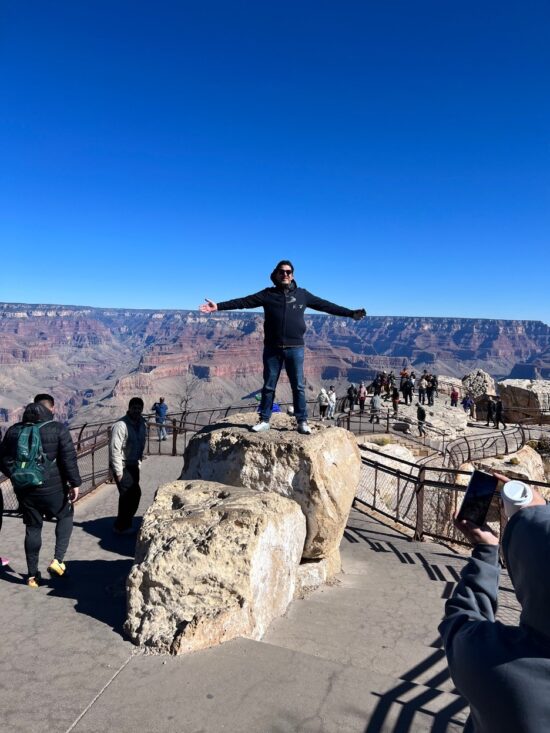Compiled by Layla Melendez, Communications Intern
This December, the Global Ties Network is exploring how international exchanges like the International Visitor Leadership Program (IVLP) advance global engagement through cultural education. In the snapshots below, Global Ties Detroit and Global Ties Arizona reflect on how international exchange programs help build cross-cultural connections, global competencies, and local appreciation for each other’s histories and heritage.
Global Ties Detroit
IVLP: Promoting Tourism to Historic Religious Sites
NPA: Meridian International Center
By Charlotte Little, Program Assistant, Global Ties Detroit
Global Ties Detroit (GTD) kicked off November 2023 with one of our most memorable programs yet. We had the pleasure of teaming up with Meridian International Center to host 10 tourism professionals from Pakistan through an International Visitor Leadership Program (IVLP), Promoting Tourism to Historic and Religious Sites. The participants met with leaders of tourism-centered organizations such as local museums and educational centers that honor the various religions, cultures, and histories of the Detroit region.
The visitors gave wonderful feedback about the program, and their Detroit counterparts praised the opportunity to meet people as passionate about tourism and cultural education as themselves. Their meetings allowed them to build meaningful cross-cultural connections, demonstrating how communities of different backgrounds can play a vital role in fostering diplomacy.
Participants toured the Detroit Historical Museum, where they discovered the city’s significant history. “Sharing Detroit’s history and our engaging collection with our international visitors was incredibly special and fun,” said Kimmie Dobos Wolfe, Manager of Education and Volunteers at the museum. “We enjoyed sharing common connections and stories together and some of us traded business cards, hoping to keep in touch.”
The group also met with Visit Detroit, an economic development corporation that markets Detroit’s tourist attractions and business prospects, where they discussed the benefits of collaborating with local businesses and government to promote tourism. “It was a great pleasure hosting and learning from the Pakistani delegation,” said Visit Detroit’s Senior Director of Communications and GTD Board Member Chris Moyer. “Our mission is Detroit to the world and the world to Detroit. Hosting this delegation provided us the perfect opportunity to do just that.”
Perhaps one of the group’s most significant site visits was to the Mata Tripta Ji Gurdwara Sahib, a Sikh worship center. Sikhism traces its roots to Pakistan and there is a sizable number of Sikh religious sites in the country, making it a special opportunity for the Gurdwara to educate the participants about the religion and heritage.“Several members of our congregation’s birthplace are in Pakistan and they had to move to India during the 1947 partition,” said Vice President of the Gurdwara’s Executive Committee Inderpal K. Deol. “They were thrilled to meet the delegation and shared the memories of their home town in Pakistan… An hour and half meeting truly felt like a reunion of family members who have been separated for over 75 years!”

Participants with representatives of the Mata Tripta Ji Gurdwara Sahib, who discussed the Sikh congregation’s local presence in the community. Image provided by Global Ties Detroit.
Cultural exchange is a powerful tool for cultivating diplomatic relations. The Pakistanis and their newfound Detroit friends gained a strong understanding and appreciation of each other by sharing their heritages and histories. Such encounters exemplify how everyone can be a peacebuilder, simply by sharing who they are.
Global Ties Arizona
IVLP: Preserving Cultural Heritage and Combating Trafficking of Conflict Antiquities
NPA: World Learning
By Paige Holtsclaw, Program Officer
Global Ties Arizona had the pleasure of welcoming 15 international visitors from the Near East and North Africa in October 2023 for a project focused on “Preserving Cultural Heritage and Combating Trafficking of Conflict Antiquities.” Global Ties Arizona was excited to provide this group with opportunities in both central and northern Arizona.
At Arizona State University’s undergraduate campus in Tempe, the group met with Arizona State University professor and urban, public, and digital historian, Mark Tebeau, Ph.D. Dr. Tebeau shared his work related to preservation, digital humanities, and public history, highlighting a current project of his called Curatescape. Curatescape is an open-source mobile framework that seeks to address challenges curators have as they shift to digital and mobile curation. The participant from Kuwait particularly connected with Dr. Tebeau’s work and was excited for opportunities to collaborate with him and his team.
While in Phoenix, the group had the opportunity to meet Elena Selestewa, a member of the Hopi Tribe from Polacca, Arizona. Elena, Visitor Center Specialist at the Phoenix Indian School Visitor Center, led the group on a tour of the grounds that was a boarding school for American Indian children from 1891 up until 1990. During the tour, she shared what it was like for Native American children to live at the school, speaking about the cutting of cultural ties and the trauma of forced assimilation to a military lifestyle. She ended the meeting with a discussion about how the Native American community has reclaimed the grounds and now uses the Visitor Center to educate the community, highlight Native American culture, and celebrate important cultural holidays and events.
As the group traveled north to Flagstaff, they stopped at Montezuma Castle National Park and met with park rangers to discuss the significance of the site and how it informs archaeologists and scholars of the Sinagua people who carved these cliff dwellings hundreds of years ago.

International visitors enjoy Montezuma Castle National Park. All images provided by Global Ties Arizona.
A cultural preservation focused trip to Arizona would not be complete without a visit to one of the seven natural wonders of the world – the Grand Canyon. Not only is the Grand Canyon National Park a breath-taking site that attracts millions of visitors each year, but it is also a place of great cultural significance to the 11 Native American tribes who have lived in and around the Grand Canyon for centuries.
During their day trip to the Grand Canyon, the group met with park rangers who discussed how they preserve the park against mass tourism, weather, and climate change. First Nation rangers also shared about the recently opened Inter-Tribal Cultural Heritage Site. The Inter-Tribal Cultural Heritage Site is a space dedicated for park visitors to learn about the culture and history of the tribes traditionally associated with the Grand Canyon. The site also provides economic opportunity for local Native American entrepreneurs to sell their artwork, jewelry, and other wares.

A visitor poses in front of the Grand Canyon.
The group’s final meeting in Arizona was with Steph Wacha, Public Lands Manager with Grand Canyon Trust, a nonprofit organization dedicated to Grand Canyon and Colorado Plateau conservation and environmental advocacy. The meeting focused on how the Trust combines their law, science, and public policy expertise to win important environmental cases that safeguard public and environmental health and support the rights of Indigenous communities. After the meeting, Steph reached out to Global Ties Arizona to express how engaging with the group and seeing common themes of cultural preservation from around the world has reenergized her. She is excited about the numerous opportunities to collaborate with the cultural preservation leaders she met through the International Visitor Leadership Program (IVLP).
Steph’s feedback and experience is a great reaffirmation that the heart of the IVLP is truly all about people-to-people connections. This program positively affects participants and communities both locally and globally. Global Ties Arizona is honored to help facilitate these connections and is proud to have hosted such an impactful group.
